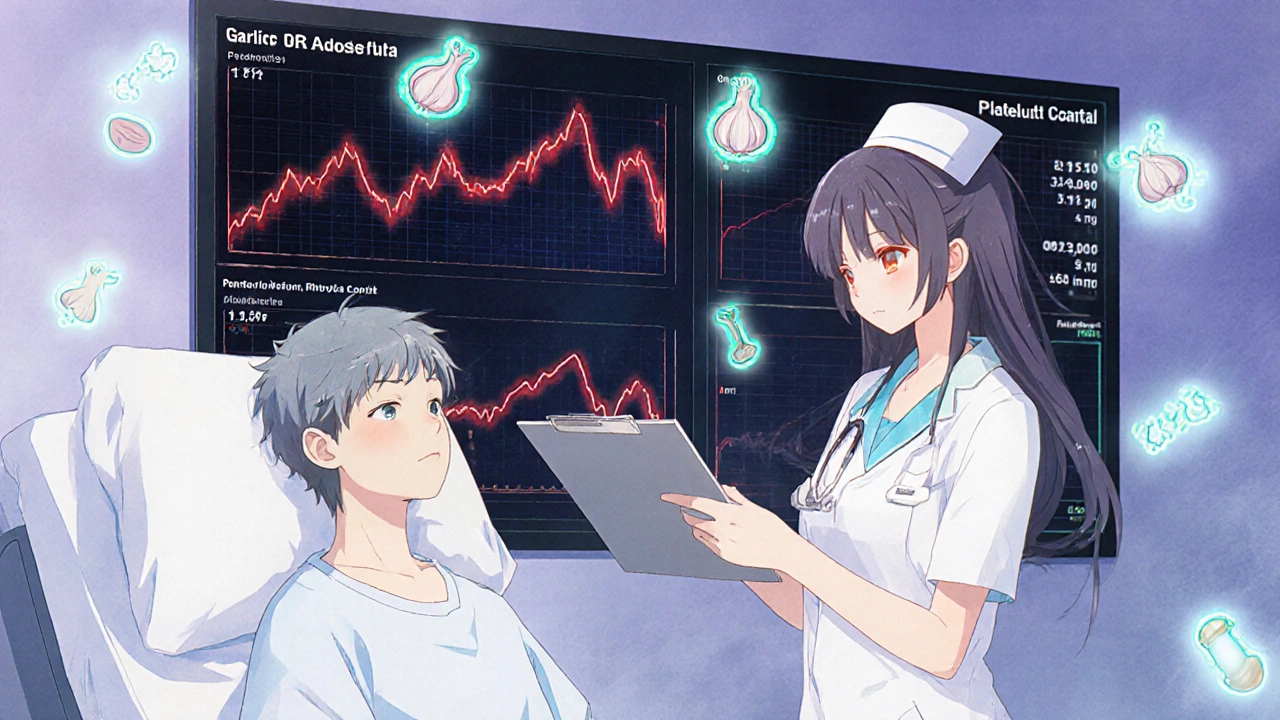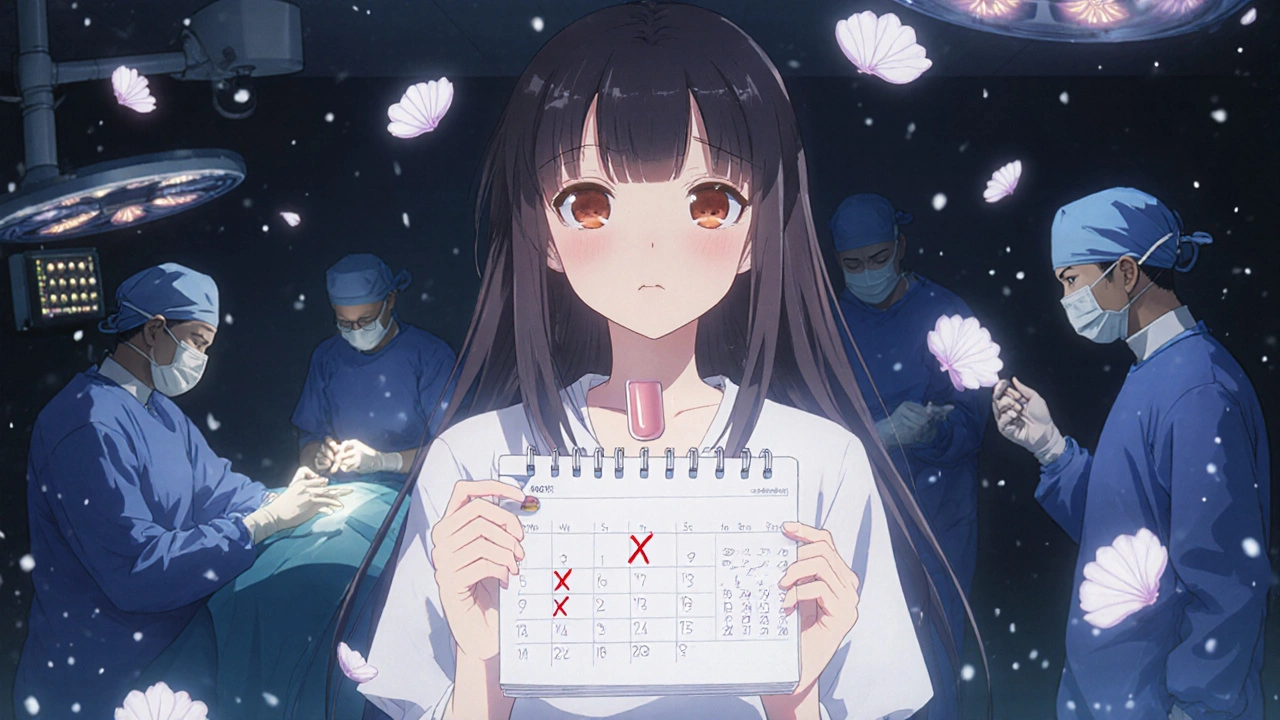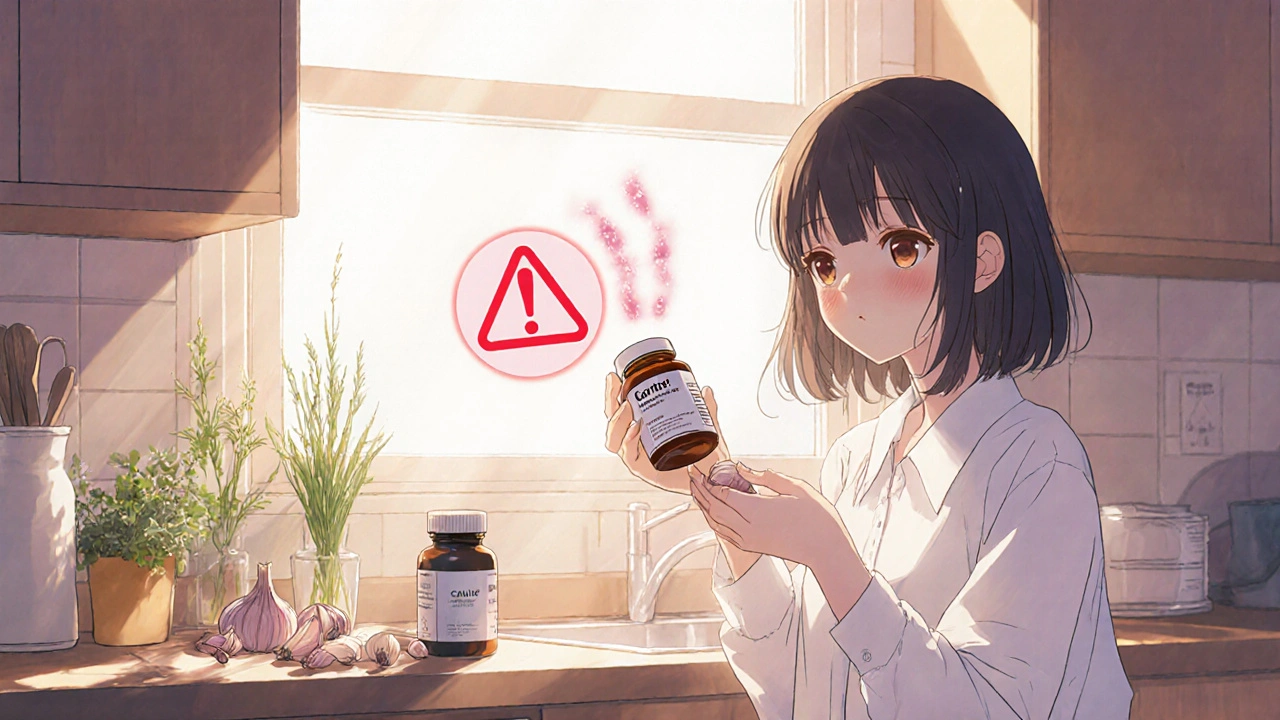When you take a blood thinner like warfarin, apixaban, or aspirin, you’re managing a delicate balance. Too much thinning, and you risk dangerous bleeding. Too little, and you could have a stroke or clot. Now add garlic supplements into the mix - and things get much more complicated. Garlic isn’t just a flavor in your stir-fry. In pill form, it’s a potent, measurable blood thinner that can push your body past the safety line - especially when you’re already on anticoagulants.
Why Garlic Supplements Are Different from Garlic in Food
Eating two cloves of garlic with your pasta is fine. Most people on blood thinners can handle that without issue. But garlic supplements? They’re not the same thing. These pills pack concentrated doses - often 600 to 1,200 milligrams per day - of active compounds that interfere with blood clotting. The main culprit is ajoene, a sulfur-based compound that permanently blocks platelets from sticking together. Platelets are the cells your body uses to seal cuts and stop bleeding. When they’re disabled, even small injuries can turn into serious problems.
Studies show that people taking garlic supplements have longer bleeding times - up to 14.3 minutes compared to 9.7 minutes in those who don’t. Their aPTT (a standard lab test for clotting function) also rises significantly. These aren’t minor changes. They’re clinically meaningful. And unlike food garlic, supplements don’t vary much in dose. You’re getting a consistent, powerful hit every day.
How Garlic Interacts With Blood Thinners
Garlic doesn’t just add to the effect of anticoagulants - it multiplies it. When you combine garlic supplements with drugs like warfarin, clopidogrel, or rivaroxaban, your risk of bleeding jumps. A 2024 meta-analysis of over 400 patients found that those taking garlic supplements along with blood thinners were more than twice as likely to develop low platelet counts (thrombocytopenia). One in 20 of them needed a blood transfusion because they bled too much.
The mechanism is straightforward: ajoene shuts down the glycoprotein IIb/IIIa receptor on platelets - the same target some prescription antiplatelet drugs hit. When you stack garlic on top of aspirin or clopidogrel, you’re essentially doubling down on platelet suppression. With warfarin, garlic may also affect how your liver processes the drug, making its effects stronger and harder to predict. The FDA doesn’t list garlic as a major risk for warfarin - but that’s only because it’s talking about culinary garlic. Supplements? That’s a different story.
Real Cases: When Garlic Almost Killed Someone
In 2012, two patients in Australia were scheduled for minimally invasive bowel surgery. Both were healthy, had normal blood tests, and weren’t on any prescribed blood thinners. But during the operation, their tissues wouldn’t stop oozing blood. The surgeons had to switch to open surgery, create a temporary ileostomy, and stop the procedure - all because both patients had been taking garlic supplements daily for months. They didn’t think it mattered. They were wrong.
Another case involved a 68-year-old man in the U.S. who took garlic pills for cholesterol and took warfarin for atrial fibrillation. He developed a brain bleed after a minor fall. His INR was dangerously high - not because he missed a dose or ate too much kale, but because he’d been taking 1,000 mg of garlic extract daily. His doctor hadn’t asked about supplements. He didn’t think to mention them.
These aren’t rare. The NIH’s Adverse Event Reporting System logged 37 cases between 2015 and 2022 where garlic supplements led to bleeding complications in people on anticoagulants. That’s just what got reported. Many more likely went unnoticed.

What Doctors Say: Clear Warnings, But Not Enough
Harvard Medical School’s Dr. Pieter Cohen says plainly: “I don’t know of any evidence that taking garlic supplements is better for your heart than eating garlic in food.” He’s right. The benefits of garlic - lower blood pressure, antimicrobial effects, possible anti-cancer properties - are real. But they’re not strong enough to justify the risk when you’re on blood thinners.
The American Society of Anesthesiologists, the American Heart Association, and the European Medicines Agency all agree: garlic supplements are a high-risk interaction. They’re listed alongside ginkgo, fish oil, and ginger as substances that can cause serious bleeding. The UC San Diego Anticoagulation Service tracks over 2,300 patients and found that those taking garlic supplements needed INR adjustments of 10-25% within days of starting or stopping them. That’s a huge swing - and it’s unpredictable.
When to Stop Garlic Supplements Before Surgery
If you’re scheduled for any kind of surgery - even a minor one like a colonoscopy or dental extraction - stop garlic supplements at least seven days before. Why seven days? Because ajoene’s effect on platelets is irreversible. Your body needs that long to make new platelets and restore normal clotting function.
Research shows patients who stopped garlic supplements seven or more days before surgery had bleeding levels almost identical to those who never took them. Those who stopped three days or less? Their blood loss was nearly double. One in three needed a transfusion.
Some hospitals now use a test called PFA-100 to check platelet function before surgery. If closure time exceeds 193 seconds, they won’t proceed without platelet transfusion. That’s how seriously they take this.

What You Should Do Right Now
If you’re on any blood thinner - warfarin, Xarelto, Eliquis, Plavix, aspirin - here’s what to do:
- Check your supplement labels. Look for “garlic extract,” “aged garlic,” “garlic oil,” or “ajoene.” If you see any of these, you’re taking a supplement - not just garlic.
- Stop taking them. If you’re planning surgery, stop at least seven days before. If you’re not planning surgery, talk to your doctor about whether you need to stop permanently.
- Talk to your doctor or pharmacist. Don’t assume they know you’re taking garlic. Most don’t ask. Bring a list of everything you take - vitamins, herbs, supplements, even teas.
- Don’t replace supplements with more garlic in food. Two to three cloves a day is safe. Ten cloves? That’s a different story. Stick to cooking, not pills.
- Get tested if you’ve been taking them. If you’ve been on garlic supplements and are on warfarin, ask for an INR check within 48-72 hours of stopping. You may need a dose adjustment.
What About Other Herbs and Supplements?
Garlic isn’t alone. Fish oil, ginger, ginkgo, turmeric, and feverfew all have similar effects. Many people take them thinking they’re “natural” and therefore safe. But natural doesn’t mean harmless. A 2022 analysis found that 68% of garlic supplements on the market don’t even list how much ajoene they contain. One bottle might have 0.1 mg per capsule. Another might have 3.2 mg. That’s a 30-fold difference. You have no idea what you’re really taking.
The same goes for red yeast rice - it’s often marketed as a “natural statin” but can cause dangerous muscle damage when combined with prescription cholesterol drugs. Don’t assume supplements are safe just because they’re on a shelf in a health store.
What’s Next? Research Is Still Evolving
Two clinical trials registered with ClinicalTrials.gov are currently studying how aged garlic extract interacts with apixaban. Preliminary results are expected by the end of 2024. The American College of Chest Physicians is also drafting new guidelines for herbal supplement use in anticoagulated patients - and garlic will be front and center.
Until then, the safest choice is clear: if you’re on blood thinners, skip the garlic pills. Eat garlic in your food. Enjoy its flavor and its mild health benefits. But don’t risk bleeding, hospitalization, or worse - for something you don’t need.
Can I still eat garlic if I’m on blood thinners?
Yes. Eating 1-3 cloves of fresh garlic per day in food is generally safe and does not significantly increase bleeding risk. The problem is concentrated supplements, not culinary use. Stick to cooking, not pills.
How long before surgery should I stop garlic supplements?
Stop garlic supplements at least seven days before any surgical procedure, including dental work or endoscopies. This gives your body time to produce new, functional platelets since garlic’s active compound, ajoene, irreversibly blocks platelet activity.
Do all garlic supplements have the same strength?
No. Garlic supplements vary wildly in potency. Some contain barely any ajoene; others have over 3 mg per capsule. A 2024 study found that 68% of products don’t even list ajoene content on the label. You can’t trust the dose unless it’s standardized and verified.
Are garlic supplements better than eating garlic for heart health?
No. There’s no strong evidence that garlic supplements improve heart health more than eating fresh garlic. In fact, experts like Dr. Pieter Cohen from Harvard say there’s no proof they’re better - and they carry real risks when combined with medications.
What should I do if I’ve been taking garlic supplements and just found out I’m on blood thinners?
Stop taking the supplements immediately. Contact your doctor or pharmacist and ask for an INR test (if you’re on warfarin) or a review of your bleeding risk. Don’t wait for symptoms. Bleeding can happen suddenly and without warning.


Comments (8)
james thomas
Look, I’ve been on warfarin for 7 years and I take garlic pills like they’re M&Ms. I don’t care what some Harvard doctor says - if I want my blood thin, I’ll make it happen. The FDA doesn’t regulate supplements like drugs, so why should I trust their warnings? You think they’re protecting you? Nah. They’re protecting Big Pharma’s profits. Garlic’s been used for millennia. You think ancient Romans were dropping dead from bleeding? Wake up.
Asia Roveda
Oh wow. Another ‘natural is safe’ idiot. You know what’s ‘natural’? Lead paint. Asbestos. Botulism. Garlic supplements are concentrated poison disguised as wellness. I work in ER. Saw a guy bleed out from a nosebleed because he took ‘aged garlic extract’ with Eliquis. He didn’t even know it was dangerous. Your ‘wellness routine’ is a death sentence waiting to happen. Stop being a guinea pig.
Micaela Yarman
It is imperative to recognize that the distinction between culinary garlic and pharmacological garlic extract is not merely quantitative, but fundamentally qualitative. The former is a foodstuff, subject to metabolic moderation by the human digestive system; the latter is a bioactive compound administered in unregulated, non-standardized doses, often without adequate disclosure of active constituents. As such, the conflation of these two entities represents a profound misunderstanding of pharmacology and dietary science. One does not equate to the other - and to do so is to invite clinical catastrophe.
mohit passi
Bro, I take garlic every day 🧄 and I’m from India where we eat it raw with chili and salt 😎 But I never took pills. I read this and I’m like… wow. Maybe I was lucky. But now I’m scared. My uncle had stroke last year. He took supplements too. 🤔 Maybe I should stop pills? But food? Food is fine. 🙏
Brittany Medley
Thank you for this. I’ve been on apixaban for AFib for 5 years and I took garlic supplements for ‘cholesterol’ for 2 years. I had no idea. I stopped them immediately after reading this. My INR was 3.8 - way too high. My doctor adjusted my dose and said I was lucky I didn’t bleed internally. Please, if you’re on blood thinners - stop the supplements. Even if you think you’re ‘healthy.’ It’s not worth it.
Rachel Whip
Just a quick note: if you’re scheduled for surgery - even a colonoscopy - and you’ve been taking garlic pills, tell your doctor. Don’t assume they’ll ask. I had a minor procedure last year and forgot to mention my turmeric + garlic combo. They had to reschedule because my platelets were acting weird. It’s not embarrassing. It’s smart. And it saves lives.
Ezequiel adrian
Who the fuck cares about garlic? I’m from Nigeria - we use garlic to cure everything from fever to bad luck. You think your fancy American pills are safer? My cousin took warfarin and garlic paste for 3 years. He’s fine. You people overthink everything. Maybe the real problem is your fear, not the garlic.
Deborah Williams
So… we’re supposed to trust a 2024 meta-analysis from a field where 68% of products don’t even list their active ingredient? 🤔 And yet, we’re supposed to trust the FDA’s silence on garlic supplements as ‘evidence’ of safety? Funny how the same people who scream ‘Big Pharma is lying!’ are suddenly quoting their guidelines like scripture. The truth? No one knows. Not the supplement companies. Not the doctors. Not the regulators. We’re all just guessing… and hoping we don’t bleed out before the next study drops. 🤷♀️